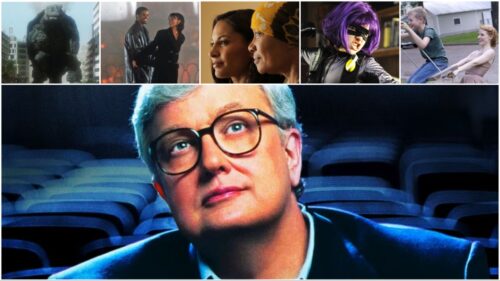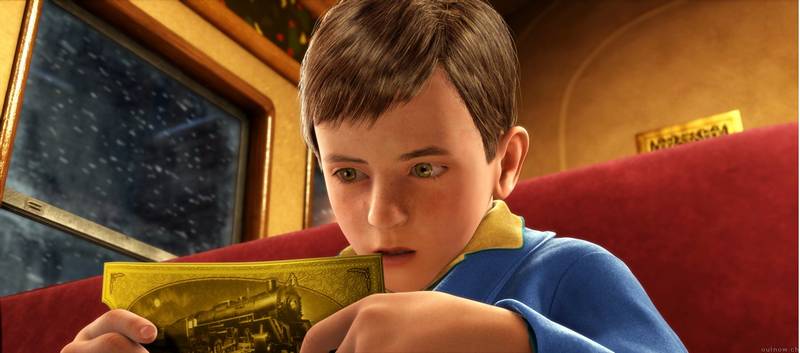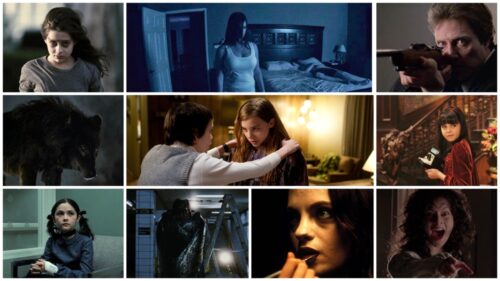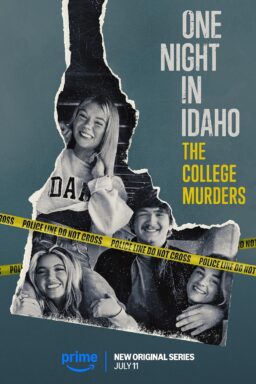It was a year when more movies opened than during any other year in memory. A year when the big Hollywood studios cast their lot with franchises, formulas, sequels, and movies marketed for narrow demographic groups–focusing so much on “product” instead of original work that they seemed likely to be shut out of the Oscars, as they were essentially shut out of the Golden Globes. A year when independent and foreign films showed extraordinary vitality. A wonderful year, that is, for moviegoers who chose carefully, and a mediocre year for those took their chances at the multiplex.
And yet the best movie of the year defied these trends. It was an expensive big-studio production by the most successful director of all time–top-lining a big star, and occupying the popular science fiction genre. But it was brilliant, a film of ideas as well as action, of seamless integration of a strong story with virtuoso special effects.
Steven Spielberg’s movie starred Tom Cruise as a policeman of the future, a man in charge of a program that uses three “precogs,” who can foresee the future, allowing them to predict crimes so they can be prevented before they happen. Based on a 1956 story by Philip K. Dick, the movie combined a classic murder plot with sensational futuristic effects and a strong human story.
The Cruise character, still devastated over the disappearance of his young son years earlier, is endangered by an apparent loophole in the precog system. In one of the most extraordinary chase sequences ever filmed, he flees from police while guided by one of the precognatives (Samantha Morton), who gives him instructions based on what is about to happen. The movie is visually dazzling. A sequence involving computer-generated “spiders” who search for Cruise within the elaborate set of a boarding house, is one of the most impressive displays of technical mastery I have ever seen. It also works as pure moviemaking. The whole movie does. “Minority Report” is mainstream moviemaking at its most sublime.
This Brazilian film will reach a fraction of Spielberg’s audience, yet is no less accomplished. A bare plot description makes it sound familiar, and yet in its energy, its dramatic impact and its exuberant visual style, it is astonishing–the Rio de Janeiro version of “GoodFellas.” Director Fernando Meirelles sets his story in the crime-based culture of the slums of Rio, where opportunities are scarce and drugs and guns are the facts of daily life. He follows a group of kids as they grow up into the city’s most famous gangs, and then, after a gang war, shows the whole process starting again.
But that description is pathetically inadequate to describe the film’s power and craft. The camera is everywhere, looking, reacting, probing; a fast-forward sequence traces the drug history of one apartment over the years; a subplot shows a character named Rocket who stumbles into a career as a newspaper photographer because he lives in a world of photo opportunities. Meirelles’ camerawork is flashy, but not tricky; his style is appropriate to the intensity of his story, as the movie races headlong through these Brazilian mean streets.
What a delightfully dizzying film about itself! Screenwriter Charlie Kaufman is assigned to adapt the book The Orchid Thief for the movies. It’s an investigation by New Yorker writer Susan Orlean into the obsessions of a Florida swamp rat named John Laroche, who steals protected orchids. But the assignment jumps the rails and the movie is about both the book and the struggle to adapt it.
Kaufman and his (fictional) twin brother Donald, both played by Nicholas Cage, wage a war over movie styles. Charlie is intense and serious, while Donald cheerfully uses commercial formulas to churn out a successful potboiler. Charlie meanwhile develops a crush on Orlean (Meryl Streep), who in turn is attracted to the intensity she feels from Laroche (Chris Cooper). The movie’s director, Spike Jonze, earlier teamed up with Kaufman on “Being John Malkovich,” the best movie of 1999. Once again they’ve made a film that is, in a way, about the experience of watching it.
In a sense, this is the best film of 1957 that was never made. Todd Haynes deliberately uses the styles, looks, themes and feel of a 1950s melodrama to investigate two subjects–homosexuality and interracial romance–that were only hinted at in that decade. His model is Douglas Sirk, who in films like “All that Heaven Allows” and “Written on the Wind” used mannered melodrama as a way of dealing with themes that were only subtly hinted at.
Because the movie uses this style sincerely, not ironically, watching it is like watching a well-crafted period film. Julianne Moore stars as a model housewife whose life goes into turmoil when her husband (Dennis Quaid) is revealed as gay, while she begins to feel strong affection for her black gardener (Dennis Haysbert). Like “Adaptation,” this is the kind of movie that makes us more aware of how we experience movies, and why.
Directed by Jill Sprecher, co-written with her sister Karen, this is a movie that circles through a group of characters in search of happiness. Matthew McConaughey plays a prosecutor who finds happiness is not the same thing as success; John Turturro is a professor who thinks he can find it by leaving his wife; Clea Duvall deserves it but is denied it; Alan Arkin is an insurance executive who does not want to cause unhappiness by firing someone;
There have been many movies which circle like a Mobius strip back to where they began. Among recent films, “Pulp Fiction” is the obvious model. Sometimes it’s only a device. Here the story circles through its characters to explore the way one life rubs against another, usually by chance, in a way that undoes plans and allows fate to make our decisions. It is also crucial that this film really cares about its characters–does not see them as markers in a story line, but as people who do, or do not, deserve what they get.
Alfonso Cuaron has made three films in one. On the top level, he tells the story of two teenage boys who drive to a legendary beach with a woman some 10 years older, who initiates them, not into the world of sex (which they are somewhat familiar with) but into the world of adult feelings. On another level, he uses a narrator to make sad or angry comments about developments in modern Mexico–comments suggested by the places they go and the people they meet. On the deepest level, the movie is about living and dying, and about a character who carries on in the face of despair.
Harmed by thin distribution and wrong-headed reviews, this film by the great Werner Herzog did not find the audience it deserved. It is a fable based on fact, set in 1930s Nazi Germany, about a Polish Jewish strongman, a blacksmith who wins a contest at a circus and is recruited to work for a Berlin charlatan (Tim Roth) who presides over a museum of mesmerism. The showman transforms the simple Jewish man into a fictional Nordic character named Siegfried, but as the strongman realizes what is being done, he rebels. There are countless movies about preludes to the Holocaust, but I can’t think of one this innocent, direct and unblinking in the face of the gathering evil.
Hayao Miyazaki of Japan is the greatest living master of animation, and this is a wonderful work about a 10-year-old girl who wanders away from her parents in a ghostly amusement park, and finds herself in a world of fantastical characters. Miyazaki’s films aren’t ceaselessly eager to make us smile; they use mood, tone and timing to deeply engage with their characters, which is why adults as well as children find his work so enchanting.
The new film by Mike Leigh tells the story of a London minicab driver and his family–a worn-down common law wife, a lonely daughter, a son who is a rude and uncouth couch potato. Hope and cheer have gone out of this family, until a sudden event shocks them back into optimism. With Timothy Spall as the cabbie and Lesley Manville as his kind but despairing wife.
A masterful performance by Michael Caine and another, no less assured, by Brendan Fraser, bring touching humanity to this story by Graham Greene, set in the early 1950s. Caine plays a British correspondent in Viet Nam, and Fraser is the young American who arrives for apparently innocent reasons. Both fall in love with the same dance-hall girl, and are as deceived in romance as in politics. The movie observes that the CIA used terrorist techniques to create a pretense for U.S. military involvement in Viet Nam, but in a curious way that is only a backdrop to the deeper story of lost love and wounded idealism.
At film festivals, juries often award a Special Jury Prize to a film that did not win first place and yet is strongly advocated by some of the jury members. It’s kind of a minority report. This year my own Overlooked Jury Prize is shared by 10 more or less overlooked films which did not reach the audiences they deserved. Some had moderate success, some were almost entirely neglected, some were praised by critics, while others, such as “Femme Fatale” and “The Man from Elysian Fields,” got bitterly divided reviews. Alphabetically:
“Diamond Men,” written and directed by Daniel M. Cohen, starred Robert Forster in a career performance as a traveling diamond salesman who is required to train his successor (Donnie Wahlberg). They learn from each other, in a plot that coils from business through crime to romance. “The Fast Runner,” directed by Zacharias Kunuk, written by Paul Apak Angilirq, is an incredible saga filmed north of the Arctic Circle, and telling a legend of the Inuit peoples, about a feud between brothers that threatens the community. “Femme Fatale” was Brian De Palma’s elegant, sexy and masterful thriller, starring Rebecca Romijn-Stamos as a woman who steals a dress made of diamonds–during the Cannes Film Festival. “Frailty,” directed by Bill Paxton, stars him as a father who becomes convinced he is receiving murder directives from an angel. The father enlists his young sons in the killings, in a fearsome reign of terror he says is sanctioned by heaven. “The Grey Zone,” directed by Tim Blake Nelson, tells the story of a revolt by Jewish prisoners in a Nazi death camp, and of an impossible choice presented when a young girl survives the gas chambers. Can one make moral decisions within a closed system which is totally evil?
“ivans xtc.,” directed by Bernard Rose, written by Rose and Lisa Enos, stars Danny Huston in a performance of startling power, as a Hollywood agent whose cocaine addiction is interrupted by a diagnosis of cancer. As he painfully approaches death, the film watches the sad forms of his courage. “Lovely and Amazing,” written and directed by Nicole Holofcener, is about a mother (Brenda Blethyn) and her three daughters, two adults (Emily Mortimer and Catherine Keener), one a young adopted girl (Raven Goodwin). All these women have body-image problems, explored with sympathy and sharp humor. “The Man from Elysian Fields,” directed by George Hickenlooper, written by Philip Jayson Lasker, stars Andy Garcia as a debt-ridden writer who signs up with an escort agency run by Mick Jagger, and meets a famous old writer (James Coburn) and his wife (Olivia Williams). It is a film about sex, privilege, service–and writing. “Songs from the Second Floor,” written and directed by Roy Anderson, is one of the strangest and most haunting films I’ve ever seen, as a grey and dismal city approaches the apocalypse with parades of flagellants, bizarre sacrifices, and darkly comic satire. Deadpan surrealism, Tati crossed with Dali. And “24 Hour Party People,” directed by Michael Winterbottom, written by Frank Cottrell Boyce, tells the story of the Manchester, England, music scene from the first Sex Pistols concert until the last bankruptcy, shines with the inspired madness of its hero, a TV personality named Tony Wilson, who takes himself seriously in a way that is utterly impossible to take seriously.
Top 10 lists by their nature are frustrating. After the critic names the best film of the year, does it really matter that one title is seventh and another ninth? One year when I alphabetized my list, however, readers were furious, as if I’d shirked my duty.
There were many films this year I admired or loved or was delighted by. If the Jury Prize is sort of an alternative top 10, then here are the films tied for 11th place:
“About a Boy,” “About Schmidt,” “Antwone Fisher,” “Auto Focus,” “Baran,” “Blade,” “Blood Work,” “Bloody Sunday,” “Bowling for Columbine,” “Changing Lanes,” “Chicago,” “The Diaries of Vaslav Nijinsky” “Frida,” “Gangs of New York,” “The Good Girl,” “Harry Potter and the Chamber of Secrets,” “How I Killed My Father,” “Igby Goes Down,” “Insomnia,” “The Kid Stays in the Picture,” “Kwik Stop,” “Lagaan: Once Upon a Time in India,” “Last Orders,” “Les Destinees,” “Lilo and Stitch,” “Lord of the Rings: The Two Towers,” “Maryam,” “Me Without You,” “Metropolis” (2002), “Moonlight Mile,” “Kandahar,” “Nicholas Nickleby,” “One Hour Photo,” “Personal Velocity,” “The Pianist,” “The Piano Teacher,” “Possession,” “Pumpkin,” “Punch-Drunk Love,” “Rabbit-Proof Fence,” “Read My Lips,” “Real Women Have Curves,” “Red Dragon,” “Signs,” “The Sleepy Time Gal,” “Solaris” (2002), “The Son's Room,” “A Song for Martin,” “Standing in the Shadows of Motown,” “Storytelling,” “The Sum of All Fears,” “Sunshine State,” “Talk to Her,” “Tully,” “25th Hour,” “What Time Is It There?,” and “XXX.”











